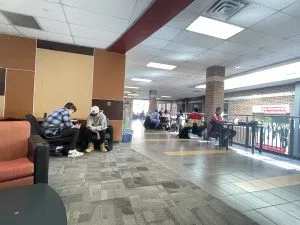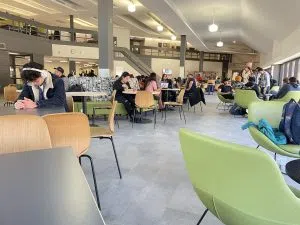Canada’s immigration changes are creating stress for international students at Fanshawe College, with new restrictions impacting work permits and post-graduation opportunities. Students like Lobke D’Haens, Jacques Lora, and Bruno Albuquerque are particularly concerned about these changes as they near graduation.

(Credit: Roger Farias)
Lobke, a Broadcasting – Radio and Multimedia Production student from Belgium, is worried about the added pressure of adapting to the new rules. “For me, this situation is stressful,” she says, especially with the added complexity of paperwork. She also questions the fairness of the English proficiency test requirement for students who have already spent years studying in Canada. “If we’ve already studied here for two years and we can prove our English skills, it should be enough,” she argues. Lobke feels the new policies overlook the value international students bring to Canada, including diverse perspectives and skills.

(Credit: Roger Farias)
Jacques Lora, a Business Analysis student from the Philippines, shares his frustration. He believes the new restrictions hinder skilled workers, especially in sectors beyond those prioritized by the government, like sales. “Sales needs skilled people like me who can help grow the industry,” he explains. Jacques also criticizes the English proficiency exam requirement. “We’ve been speaking English every day, and everything we do here is in English. It’s ironic to make us take the test again,” he says. Lora spent more than $300 CAD on the English test in January in Mississauga, as there was no option available in London.

(Credit: Roger Farias)
Bruno Albuquerque, a second-year Broadcasting – TV and Film Production student from Brazil, is also affected by the changes, which are particularly challenging for students planning to apply for Post-Graduation Work Permits (PGWPs). “The government changed the rules less than six months before I was about to apply,” he says. Bruno also points out the impact on students who arrived with spouses, as the new regulations prevent partners from working if the main applicant is not in a specific position. “I know a lot of Brazilian students who are going back to Brazil because it’s financially impossible to stay here without their partners being able to work,” he adds.
The frustration is compounded by the suddenness of the changes, which aim to manage the growing number of international students in Canada. “In 2022, Canada received around 300,000 to 400,000 newcomers. In 2023, that number skyrocketed to 1.2 million,” Bruno notes. He argues that the government’s attempts to address the influx are unfair to students who had no control over the numbers. “It’s nonsense how the government can make such a big mistake without realizing it.”

(Credit: Roger Farias)
Despite these challenges, the students remain determined. Lobke, who loves Canada, is committed to staying and contributing to the country’s growth. “I want to stay here,” she says. Jacques and Bruno also hope to navigate the system and find opportunities to continue their careers.
On March 18, 2025, Canada announced an important change: international graduates of college bachelor’s programs no longer need to meet field-of-study criteria to qualify for PGWPs. This aligns eligibility for college bachelor’s graduates with that of university bachelor’s graduates. That said, students have grown accustomed to regularly checking for updates, as the rules can sometimes change for better or worse depending on their status.
To hear more from these sources, check out our Almost 107 Podcast, available wherever you listen to podcasts or via the following link:












